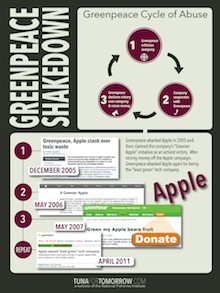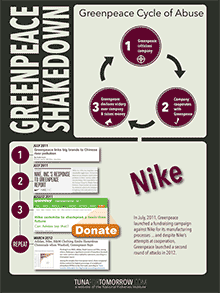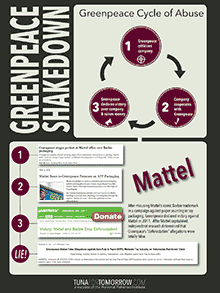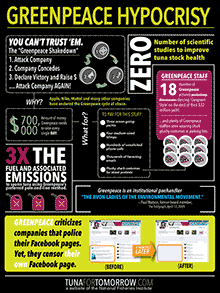The Sustainable Fisheries Partnership (SFP), in collaboration with Greenpeace, Birdlife International, and The Nature Conservancy, has released a report ŌĆō Best Practices for Reducing Bycatch in Longline Tuna Fisheries ŌĆō focused on minimizing bycatch in longline tuna fisheries. Perhaps the best thing the report does is draw readersŌĆÖ attention to the important work already being done by the International Seafood Sustainability Foundation (ISSF) to mitigate bycatch. But where the report veers into editorializing it distorts reality and misleads readers.
Take for instance a comment about the lack of ŌĆ£political will to achieve broad industry uptake of best practices.ŌĆØ While we can safely guess which of the collaborators inserted this language, it directly contradicts the reportŌĆÖs commendation of ISSF, which has for years been working with the industry to implement mitigation best practices, even as Greenpeace has refused a seat at the table.
The report also distorts bycatch statistics in crucial ways. For instance, the standard definition of bycatch includes species that commonly end up in markets, including ŌĆ£undersized tuna, marlin and swordfishŌĆØ (p. 8). But the report focuses instead on wildlife unrelated to fisheries, such as birds. This may stir the emotions of some of the collaboratorŌĆÖs donors, but it obscures the fact that bycatch rates overall are at historic lows, thanks in large part to ISSF and industry efforts.
This context is important because, as is noted in the report some bycatch mitigation tactics meant to help one species could detrimentally impact another, and sustainability experts must weigh options to avoid doing more harm more than good.
Meanwhile, buried in the report, and left out of the summary and press release, is a citation from ISSF noting that longline tuna fisheries only account for about twelve percent of the world tuna supply.
ThatŌĆÖs right. This 26-page report focuses only on a small fraction of the industry, and has nothing to say about skipjack, which comprises the majority of the canned tuna market. Perhaps the certain authors avoided that conversation because world tuna stocks, including skipjack levels, were deemed healthy by top researchers.
The work of fisheries experts, scientists, and industry stakeholders to ensure the continued sustainability and health of global tuna stocks is ongoing, and to the extent that this report highlights and directs interested parties to that work, itŌĆÖs welcome. But for collaborators with a history of hyperbole and fundraising attached to their naysaying weŌĆÖll be watching how you useŌĆ” or misuse this report.








